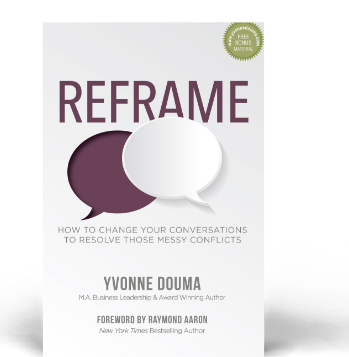Conflict is not a bad word. Often, we avoid conflict in our society because we do not want to make the other person angry. This leads to group-think: “Everyone agrees so we can keep the peace.”
This is especially a trait that Canadians have.
What we need to realize, though, is if we have a differing opinion, this can add to the idea already on the floor. And then ideas can build and grow.
What Is Conflict?
Let’s establish what conflict is. According to Vocabulary.com, a conflict is a struggle or an opposition. If you and your best friend both fall in love with the same person, you will have to find some way to resolve the conflict.
Conflict comes from the Latin word for striking, but it isn’t always violent. Conflict can arise from opposing ideas.
As people are incredibly diverse, there are many opportunities for conflict to occur in our lives. Even though conflict can sometimes be challenging to get through, we need it to grow and thrive.
Yes, you read that correctly. We need to work through conflict with others to become better versions of ourselves.
One of my favourite verses in the Bible is from Proverbs (27:17), which tells us, “As iron sharpens iron, so one person sharpens another.” It is so very true; if you simply stand back and let the iron stay in a clump, what good would that do for everyone?
What is your concept of conflict?
- When your partner is upset with you, do you run for the hills? Or do you prefer to tackle the conversation as soon as possible?
- Are there specific rules of engagement (behaviour) that are acceptable for you? Does your conflict often include hurtful language?
- Do you need to resolve conflict before bedtime, or are you content with going to sleep angry?
- When you are angry, do you resort to name-calling or the silent treatment? Or is that type of behaviour a deal-breaker for you?
- Do you believe conflict is normal and a great way to work things out? Or do you believe conflict is unhealthy, and so you avoid it at all costs?
- Do you see workplace conflicts (among your peers) as opportunities to contribute to dysfunctional gossip so that you can get close to the popular crowd?
- How about when you get into a conflict with a colleague? Do you immediately run to their supervisor to complain or try to work it out first?
People who conflict well together, stay together!
How couples resolve conflict is a strong indicator of how successful their relationship will be. Why? Disagreements can help bring couples closer together; addressing issues, solving them, and letting them go afterward helps build a tight bond. It allows you to know and trust each other more.
And when you do it right, you can learn from your conflicts so that you don’t repeat the same communication mistakes over and over again.
Then there are the relationships we have with family members, friends,neighbours, colleagues, and acquaintances, presenting unique opportunities for conflict and learning.
Therefore, it’s just as important for you to use effective communication in all of your relationships.
Conflict is not something to run and hide from. Instead, it’s an opportunity to have healthy and helpful communication to resolve immediate differences and improve relationships. When done correctly, resolving conflict allows you the chance to state your point of view and say how you feel.
Why Conflict Happens
Human psychology is fascinating. What makes humans tick and what gets us upset varies significantly from person to person. Even within the same family, there can be many conflicts between siblings, parents and children, and couples.
When we communicate with someone, there is always an opportunity for the conversation to go sideways. People often find themselves in arguments with loved ones when that was not their intention.
So, while not intending to be hurtful is important, what we say and how we say it is what counts, as our words matter.
What I mean is, that you may not intend to hurt your friend’s feelings, but because you were rushed for time or stressed out about money, you flipped out on them and were cruel in your delivery. The result is that you caused harm to the relationship.
If you care about the person, it’s up to you to fix what you broke, which means owning up to what you said, apologizing, and doing better the next time.
But then there are times that you say something that you think is harmless, and conflict still occurs. The reason this happens is that we all have different filters. It can be confusing because what you say can be upsetting to one person and okay for someone else. It’s because we are all so different.
As we each walk through the world, we view it through a different lens. Based on who we are and our life experiences, we inevitably view situations differently because of our lens or filters.
Conflict and Emotional Intelligence
What do you bring to a relationship?
We have acquired ways of thinking, feeling, and acting, based on the bits and pieces we picked up along our journey. The bits and pieces (often referred to as “baggage” or “stuff”) are what make us who we are. It is what differentiates us from others. It is what makes us unique. And it is what makes us flawed.
Much of your bits and pieces are made up of the following:
- Your life experiences/how you were raised
- Your values and beliefs
- Communication and interpersonal skills
- Needs, wants, and goals
- Perceptions and attitudes
- Cognitive distortions
- Broken (past) relationship “baggage”/broken heart/protective walls
- Pressures/stress/fears/power
- Trauma or abuse
- Self-awareness/personal development
What we do with our bits and pieces and how well we communicate with others is due primarily to our emotional intelligence (EQ).
A higher EQ enables us to understand ourselves, manage our emotions, relieve our own stress, overcome challenges, read people’s signals, empathize, communicate effectively, and defuse conflict.
In other words, we can play nicely with others in the sandbox!
In addition to the above list of bits and pieces, our personal concepts can impact how well we get along.
If you are in a relationship, have you looked at the differences or similarities between you and your partner? For example, what are your concepts of money?
- What are your habits – are you a saver or a spender?
- Are you a risky or conservative investor?
- Do you run up your credit cards and pay only the monthly minimum, or pay off the entire amount when the bill comes in?
If you and your partner differ on these, there is plenty of room for conflict to occur.
What is your concept of relationships?
- Do you have traditional gender roles, or do you prefer a modern approach?
- Do you want to have children, or do you prefer to borrow your sister’s kids when you get the urge?
- What are your thoughts on disciplining children?
How much you and your partner differ on these concepts will likely determine how many repeat arguments you have.
What are your concepts of workplace communication?
- Do you write general emails, or do you write them according to the audience (e.g., peer, supervisor, client)?
- When an idea is raised in a meeting, do you discuss your objection to it then and there, or do you prefer to talk negatively behind your colleague’s back?
- If your officemate talks too loudly during their phone calls, do you say something rude or politely ask them to be mindful of their volume?
Communication Tools
Communication tools are your friend.
When you disagree with someone, your automatic response may be to react and act based on how you feel about the conversation. But how you handle it varies greatly. It’s essential to identify what is happening in the situation and be aware of your internal resources (communication skills) before you start to react.
As communication hiccups and conflicts arise, my new book Reframe: How to Change your Conversations to Avoid those Messy Conflicts, (to be launched soon!) offers tools you can draw on to help resolve many miscommunication situations that you may find yourself in.
What’s more, you will be able to handle communication with more ease and less pain, preventing any verbal hiccups from occurring, based on your newfound knowledge!
Ultimately, with all communication, you can choose to be positive (e.g., respectful, kind, helpful, understanding). Alternatively, you can choose to have the situation escalate into something more serious by being negative (e.g., sarcastic, hurtful, judgmental, mean-spirited).
What do you choose?

